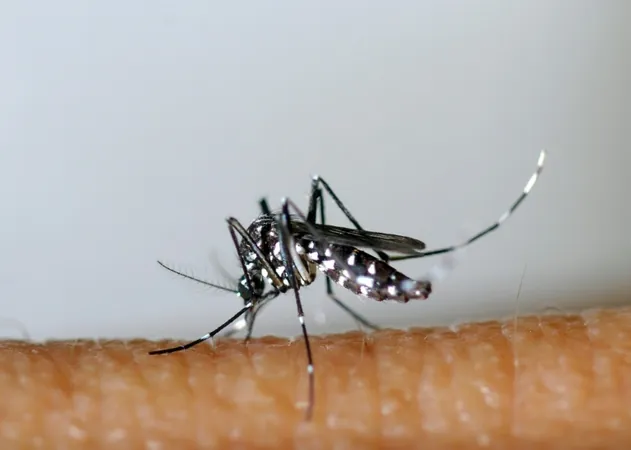
Shocking Study Reveals Climate Change Responsible for One in Five Dengue Cases!
2024-11-16
Author: Mei
Introduction
A groundbreaking study by U.S. researchers has uncovered that nearly 20% of the staggering number of dengue fever cases reported globally this year can be traced back to climate change. This alarming statistic sheds light on the intricate connection between rising temperatures and the spread of infectious diseases.
Impact of Climate Change on Public Health
As the world grapples with a string of extreme weather events—hurricanes, wildfires, droughts, and floods—the impact of climate change on public health remains an emerging area of study. Dr. Erin Mordecai, an infectious disease ecologist at Stanford University, explains that dengue fever serves as a prime example due to its sensitivity to climate variations.
Dengue Fever and Its Transmission
Dengue, transmitted through the bites of infected mosquitoes, presents symptoms such as fever, severe body aches, and can occasionally be fatal. Traditionally confined to tropical and subtropical regions, the rising temperatures have enabled mosquitoes to migrate to previously unaffected areas, bringing dengue along with them.
Research Findings
In the unreviewed study, researchers analyzed data from 21 countries, predominantly in Asia and the Americas, revealing a strong correlation between increased temperatures and dengue cases. They estimated that about 19% of current dengue infections globally can be attributed to past climate warming. Temperatures ranging from 20-29 degrees Celsius (68-84 degrees Fahrenheit) create optimal conditions for the proliferation of dengue.
Predictions for the Future
The potential impact of these temperature changes is staggering; researchers project that regions in elevated areas of countries like Peru, Mexico, Bolivia, and Brazil may see a dramatic 200% rise in dengue cases over the next 25 years. This prediction poses a significant threat, with at least 257 million people currently residing in areas where climate change could potentially double dengue rates within that time span.
Call to Action
Dr. Mordecai emphasizes that this startling connection is yet another crucial reason to prioritize efforts against climate change. By September of this year, over 12.7 million dengue cases had already been documented, nearly double the previous record for 2023. However, due to significant underreporting, some estimates suggest the actual figure could be as high as 100 million cases.
Innovative Solutions in the Fight Against Dengue
At the recent annual meeting of the American Society of Tropical Medicine and Hygiene in New Orleans, researchers also discussed an exciting development in the fight against dengue. Efforts are underway to utilize a bacterium known as Wolbachia, which can inhibit mosquitoes' ability to spread the disease. After its introduction in Niteroi, Brazil, five years ago, the city experienced significantly lower dengue cases amid one of the country’s worst outbreaks this year—leading to only a minimal increase in reported cases compared to other regions.
Conclusion
The success of the Wolbachia project in Niteroi could pave the way for substantial community protection against the surging global incidences of dengue. Researchers have even partnered with the Brazilian government to construct a facility to breed Wolbachia-infected mosquitoes, aiming to shield millions from potential outbreaks. As we move forward, the evidence mounting around the intersection of climate change and public health cannot be ignored. The urgent need for action has never been clearer, as rising temperatures continue to create fertile ground for diseases like dengue to expand their reach into new territories.





 Brasil (PT)
Brasil (PT)
 Canada (EN)
Canada (EN)
 Chile (ES)
Chile (ES)
 España (ES)
España (ES)
 France (FR)
France (FR)
 Hong Kong (EN)
Hong Kong (EN)
 Italia (IT)
Italia (IT)
 日本 (JA)
日本 (JA)
 Magyarország (HU)
Magyarország (HU)
 Norge (NO)
Norge (NO)
 Polska (PL)
Polska (PL)
 Schweiz (DE)
Schweiz (DE)
 Singapore (EN)
Singapore (EN)
 Sverige (SV)
Sverige (SV)
 Suomi (FI)
Suomi (FI)
 Türkiye (TR)
Türkiye (TR)